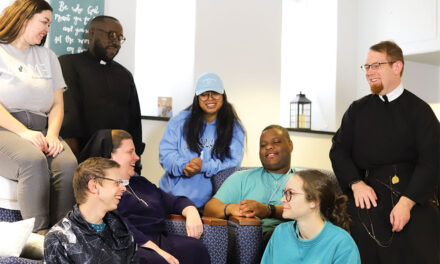The last time your doctor told you to have blood work done, you probably went to a medical facility where a phlebotomist drew blood from your arm, and you were sent on your way. That sample was then sent to the lab where dozens of behind-the-scenes medical laboratory professionals analyzed the samples and provided a diagnosis.
Tiffany Gill ’04, MLS (ASCP) is a medical laboratory scientist and tenured professor who is concerned about the medical laboratory’s lack of visibility in the community. After all, pathologists, phlebotomists, medical laboratory scientists, medical laboratory technicians, histology technologists, and histology technicians are in high demand, and medicine, vaccines, diagnoses, and medicine dosages are made or influenced by laboratorians. Since most people do not know what medical laboratorians do and the critical roles they play in health care, Gill has tried to fix this problem. In fact, because of her long-standing and effective strides in calling attention to laboratorians, the American Society for Clinical Pathology (ASCP) recognized Gill as a Top Five “40 Under Forty” honoree and gave her the Career Ambassador Award for 2022.
YouTube Star
For over a decade, Gill has run the medical laboratory technology program at the College of Southern Maryland, where she also serves as the academic program coordinator. While teaching in the lab, she noticed that students would become disengaged if they had trouble seeing the demonstrations. To solve this problem, she started recording her lab demonstrations and making them available online.
“I thought I could do better for my students, improve transparency, and improve accessibility of the information so students would be able to review the content on-demand with the best seat in the house. Now, students are required to watch certain videos before classroom lab in order to prepare,” Gill stated.
In 2017, she launched her own YouTube channel, Medical Lab Lady Gill, to offer the lab demonstration videos to anyone who wanted them. To her surprise, people across the world viewed them, especially during the pandemic when faculty members needed virtual learning tools. Students and professionals from all educational levels—including medical schools, laboratory education programs, and high schools—are using Gill’s videos. Although the purpose of the videos is to support students, she also recognizes that it promotes the field and helps other program directors.
The Cell Bowl
Gill’s creativity didn’t end with the Medical Lab Lady channel. As an active member of ASCP, she is a mentor and career ambassador who serves on the social media committee, where she is charged with developing an annual “passion project” that promotes and supports the profession.
For her first passion project, Gill took a competition she used in her medical laboratory technology program and made it a national event, the Cell Bowl. The Cell Bowl is a virtual NFL-style hematology competition where MLT and MLS college students must correctly identify up to 30 hematology cells in one minute using an app. The students who do this in the shortest amount of time earn points for their team. For the first four weeks, the regions compete against themselves, with the top two teams advancing to the playoffs. From this pool, the top three programs from the first round of the playoffs continue to the semi-finals. Finally, the top two programs vie for the Super Cell Bowl national title.
Seventy-one laboratory technology programs across the country participated in Cell Bowl I. In this year’s Cell Bowl II, 87 programs from 41 states and districts participated.
For each week’s virtual Cell Bowl segment, Gill and cohost Aaron Odegard, the former chair of ASCP’s council for laboratory professionals, highlight participating National Accrediting Agency for Clinical Laboratory Sciences (NAACLS) accredited medical laboratory educational programs, discuss advancement in the profession, and provide a tutorial on a specific hematology cell line. They also invite a hematologist to discuss the competition and provide a tutorial.
“We joke around and have a really good time, but it’s all very informative,” Gill states. “I have noticed that on the certification exam, it has helped our recent graduates to improve in the hematology section.”
Continuing to expand the reach of Medical Lab Lady Gill’s channel, she also created a microbiology Pictionary-like game in spring 2022. She invited world-renowned microbiologists and a pathologist who specializes in parasitology to help bring visibility to this section of the laboratory. However, according to Gill, no matter what tools you use to teach, you must reach your students, or the tools are not effective.

Videos
Views
Subscribers
Cell Bowl
Building A Foundation

Gill holds the ASCP Career Ambassador and ASCP 40 Under Forty Top Five Honoree 2022 awards at the 100th Anniversary Awards Luncheon.
Growing up in Maryland, Gill wasn’t sure what interests to explore and turn into a career. She wanted to be a veterinarian, then a singer and finally a physician. After high school, she enrolled at Immaculata as a biology-chemistry major, which is the University’s pre-med program. As an undergraduate student, she learned the basics that would form the foundation for her career. Although she consistently made the dean’s list, was a member of the Immaculata Honor Society and the bio-chem club and president of Sigma Zeta (national honor society for natural sciences, computer science, and mathematics), she never relinquished her love for music. She joined the chorale, the show choir, started a saxophone quartet, was a member of the theater group and was active in the art department. “I was a very artsy person, but I loved science as well,” Gill acknowledged. “Science really is art too; it’s just living art,” she pointed out.
When she graduated from Immaculata, she realized that what appealed to her about being a physician actually came from the laboratory. Soon she began working in a local hospital lab in Maryland while awaiting acceptance into the one-year MLS program at Medstar Washington Hospital Center School of Medical Technology in Washington, D.C. Gill worked in the cytopathology department while in the program. “I was excelling in a way that surprised a lot of people. They were like, ‘You already seem like you know what you’re doing.’ But they didn’t know my laboratory background,” Gill said.
After becoming ASCP certified, Gill began teaching in Medstar Washington Hospital Center’s program as the clinical chemistry instructor, training employees, and teaching students rotating in the laboratory from other institutions.
Since the early days of her career, Gill has indeed excelled in every aspect of her profession and is worthy of the accolades bestowed upon her. As a true advocate for her profession, she is shedding light—and recognition—on the field of pathology and laboratory medicine.
However, the best reward will come when more people understand what happens to their blood when it’s sent to the lab.





